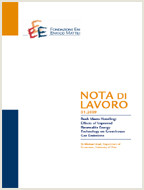Social Capital and Political Accountability

27.04.2010
Tommaso Nannicini, Andrea Stella, Guido Tabellini, Ugo Troiano
D72, D73, Z10
Social Capital, Culture, Political Agency
Economy and Society
Gianmarco I.P. Ottaviano
In this paper, we empirically investigate a channel through which social capital may improve economic wellbeing and the functioning of institutions: political accountability. The main idea is that voters who share norms of generalized morality demand higher standards of behavior on their elected representavtives, are more willing to bear the cost of acquiring information, and are more likely to base their vote on criteria of social welfare rather than (narrow) personal interest. We take this conjecture to the data using information on the Italian members of Parliament in the postwar period (1948–2001). The empirical evidence shows that the electoral punishment of political misbehavior is considerably larger in electoral districts with high social capital, where social capital is measured by blood donation, and political misbehavior refers to receiving a request of criminal prosecution or shirking in parliamentary activity. Accordingly, episodes of political misbehavior are less frequent in electoral districts with high social capital.
